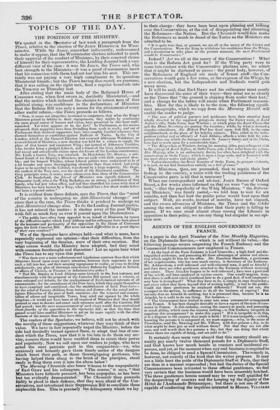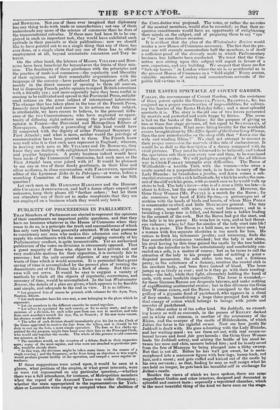AGENTS OF THE ENGLISH GOVERNMENT IN FRANCE.
IN a paper in the April Number of the New Monthly Magazine, on the Diplomatic Service,—which is not without its value,—the following passage occurs respecting the French Embassy and the Commercial Commissioners now employed in France.
"At the head of the Paris Embassy is Lord Granville ; a high-bred and dis- tinguished nobleman, and possessing all those advantages of station and educa- tion which might fit him for his office. Mr. Hamilton Hamilton, a gentleman of fair acquirements, who has seen much service, is Secretary of the Embassy. Mr. Ashburnham, a well-informed and well-educated man, is paid as Attaché; and then there are other gentlemen attached to the Embassy without receiving any salary. These Attaches happen to be well-informed ; have seen a good deal of the world, and been employed at various courts. One would imagine, then, that there is sufficient talent combined here to do a good deal, if welremployed: now how is it employed? What they have to do, is simply to copy despatches; and every talent they have, beyond that of writing legibly, is lost to the public. Could not these gentlemen be employed differently? Would not one, the youngest in the service, be sufficient to do all the business of copying? But not only does an Attache do nothing, but it is presumed that, because he is an Attache, he is unfit to do anything. For instance,—
" The Government have wished to enter into some commercial arrangement with France. It has been thought desirable to have a report of the state of com- merce in France. Is this embassy, costing the country so much, and possessing so much ability, which costs the country nothing—is this Embassy incapable to. negotiate this arrangement ? to make this report ? If it is incapable to do this, it is a disgrace to the country that sends it forth! If it is not incapable,—which, knowing the persons it is composed of, we must suppose,— i why, n the name of Providence, Send Dr. Bowring and Mr. Villiers, with five guineas a day, to do what might be done just as well without them? Not that they are not able men, and well worth their five guineas a day, but they ate doing that which others there are capable of doing, and are paid to do."
It certainly does seem very absurd that this country should an- nually pay nearly twelve thousand pounds for a Diplomatic Staff, and God knows how much beside in couriers and incidental ex- penses, and yet, at the moment when any real business is required to be done, be obliged to send a Special Commission. The remedy is, _however, not exactly of the kind that the writer proposes. It may not a little hurt the pride of the Diplomatic Staff at Paris, that they are thus in a manner superseded ; but had the duties of the Special Commissioners been intrusted to these official gentlemen, we feel very certain that the business would have been miserably botched. The three gentlemen herein named may be very well qualified for • the despatching of couriers and the keeping -up the dignity of the H8tel de fAmbassade Britannique; but there is not one of them capable of conducting the inquiries intrusted to Messrs. ViLidEas i has any thing to do with trade or manufactures; not one of them understands any more of the science of commerce than he does of the transcendental calculus. If these men had been fit to be em- ployed in such an important task, they would have exhibited such aptitude in their pursuits or their publications : now we should like to have pointed out to us a single thing that any of them has ever done, or a single claim that any one of them has to official employment at all, beyond aristocratic connexion and Tory in- terest.
On the other hand, the labours of Messrs. VILLIERS and Bow- RING have been beneficial far beyond even the limits of their mis- sion. The familiarity of these gentlemen with the principles and the practice of trade and commerce—the popularity and liberality of their opinions, and their remarkable acquaintance with the language of the country—have produced the happiest effect, not merely in the' direct manner of opening to them all sources, but in disposing French public opinion to regard British intentions with a friendly eye ; and more especially have they been useful in causing to be cultivated and spread in the Provincial Press, enlight- ened notions on the great subject of international intercourse. The change that has taken place in the tone of the French Press, formerly most bigoted and narrow in its notions on this subject, is attributable, we have reason to believe, to the personal influ- ence of the two Commissioners; who have neglected no oppor- tunity of diffusing right notions among the powerful organs of opinion in France—the Provincial and Metropolitan Editors of Newspapers. Assuredly a proceeding of this kind would have ill comported with the dignity of either Principal Secretary or First Attache ; and what is more, neither would the privilege of communication have been granted to them. The French know very well who it is that such men represent in England; whereas, in meeting such men as Mr. VILLIERS and Dr. BOWRING, they know they are dealing with enlightened lovers of science, of peace,



















 Previous page
Previous page